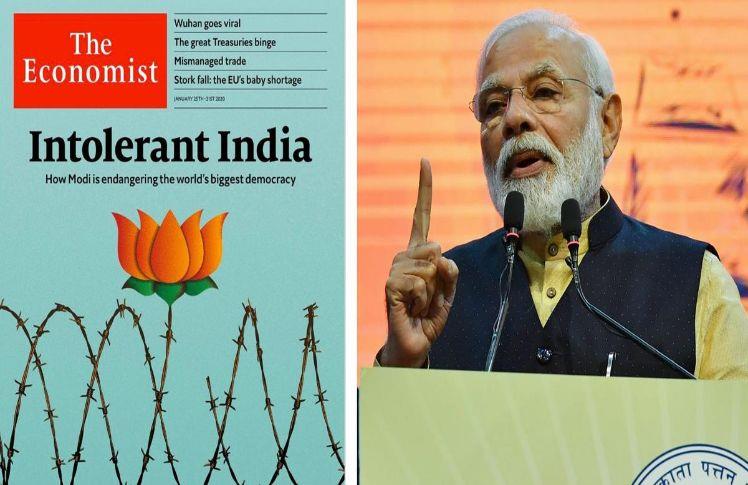
Hugging world leaders, taking ‘selfies’ with them and organizing mega-events in foreign cities to polish Prime Minister Narendra Modi’s image, have started bringing diminishing returns. The world is waking up to recognizing the Modi regime for what it always was – illiberal and majoritarian. The domestic media is far too domesticated to point to the emperor’s new clothes. It has been left, therefore, to the western media to point out that he runs an autocratic, authoritarian, Hindu majoritarian government.
Unlike in India, the Modi regime cannot manage headlines globally. This has become increasingly evident. Headlines such as “India’s Narendra Modi has had a free pass from West for too long” (Financial Times), India’s Narendra Modi isn’t a game-changer (Foreign Policy), Howdy Modi and goodbye growth (Wall Street Journal), Narendra Modi is damaging India’s economy as well its democracy (The Economist) and Punitive populism is fully operational in Modi’s new India (The Conversation) are but an indicative sample of a global reality check on Prime Minister Modi and his government.
Foreign Media
Unlike some of his illustrious predecessors, Prime Minister Modi never occupied any high moral ground – either because of personal sacrifice or by having elevated governance to new ethical standards. His record till his spectacular victory in 2014 had been dismal. Many Western countries did not want him to set foot on their soil. He became acceptable only after he was elected the leader of the world’s largest democracy – one which prided itself on the rule of law and the equality of its citizens before the law.
Those in the West who tried to see in him a bold conservative reformer who could lead India’s growth story and open its markets are having a rethink. The Economist has declared, “India’s economy is incompetently managed and doing badly”. It predicts that PM Modi could “stop posing as a reformer and fully embrace his alter-ego, as a chest-thumping Hindu nationalist.” Similarly, The Washington Post also notes regretfully that Modi’s “economic reforms have been a bust” and that he had “transitioned from an economic to a nationalist message” turning voter anger against “elites and minorities”.
Problems after Removing 370
The revocation of the special status of Jammu and Kashmir, dividing it into two centrally governed provinces and the military clampdown have tipped the balance against the Modi regime. The world can see that asymmetric federalism which was the basis of the Indian Union’s strength has been junked for a unitary vision. The government’s and pliant media’s celebration of “normalcy” in Kashmir Valley is nothing but self-deluding propaganda.
The fact is that the international community is perturbed with the developments in Kashmir, especially the communication restrictions and the continued incarceration of the state’s political leadership. American and European lawmakers increasingly see Prime Minister Modi as the moving force behind a majoritarian project to undermine India’s secularism. The kind of resentment against India in the US Congress today, according to press reports from Washington DC, is as visceral as it was in 1998 after the nuclear tests.
Current Scenario
Prime Minister Modi’s image is on a slippery slope and things may get much worse. He is reshaping to his advantage the institutions that could have been a check on the Executive. The Election Commission’s neutrality is being destroyed by targeting the lone Election Commissioner who had the courage of his convictions. The Right to Information Act has been weakened and Information Commissioners have been reduced in stature and their tenure subjected to the government’s discretion. Political funding has been made opaque to benefit the ruling party. The regime’s political rivals are routinely ridiculed and deprecated by a captive media. In short, the government is rewriting the rules of the game to suit itself.
In today’s connected world, none of this will go unnoticed. In fact, social scientists are already using analytical categories from criminology, like “punitive populism”, to describe his mode of governance. It seems doubtful whether global opinion about Prime Minister Modi will change in the near future. However, it is not only his reputation that has taken a knock. The image of India as a seriously flawed democracy is also likely to get deeply etched in the international psyche. And that may take a very long time to undo.
Leave a comment: (Your email will not be published)